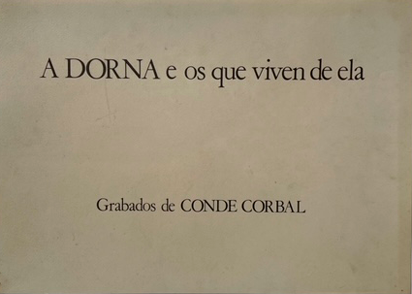Publications and forewords
THE DORNA AND THE ONES WHO LIVE FROM IT
Engravings by Conde Corbal
Prologue: Xaquín Lorenzo “Xocas”
AFTER FORTY YEARS, this article that Xaquín Lorenzo, known as “Xocas”, had written for the magazine Nós, in 1933, retains all the interest and relevance that I think the labour problem of the dorna [typical Galician rowing boat] has. Xocas said:
Timing is critical: many customs and typical boats are disappearing; soon they will not be more than an early memory of sailors, who, in the windy winter mornings, will tell their grandchildren their duties on board those ships, when they looked at death in the face for so many nautical days.
The dorna xeiteira is coming to an end. Internal combustion engines are ousting it, its field is limited.
We should not mourn the loss if it means progress, but the popular statements must be carefully studied. We have to consider that they forced the brave and daring soul of our sailors,
The dorna means a change from family fishing to cooperativism; it is owned by a family and it needs three men and a boy to man it. If the family has not enough people, the owner invites other sailors to join them. Both, the ones and the others, take benefit of fishing. The owner has no other advantage than manning the ship with the category of skipper.
This is how the dorna supplies the need of fishing of poor sailors. Without it, they could not be devoted to deep sea fishing relatively often.
The shipbuilding of the dorna involves specialized carpenters in small shipyards. Pine wood is used for almost everything, because the keel has to be made of oak.
There are two kinds of dornas: a large one, called “dorna de tope” or “xeiteira” and a small one, three or four meters long, called “dorna pulpera”, especially used por octopus fishing.
The uncertain life of salilors, always rowing through treacherous waters, provided with them a generous spirit and a broad concept of life and passion.
The see is cradle and grave for them. They spend their lives sailing.
As the rocks beated by the see against the beaches, these men los their hopes in dealing with the sea and now they upsetly undergo their situation in many areas of rural life.
XAQUÍN LORENZO
